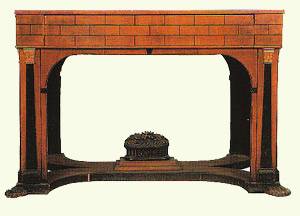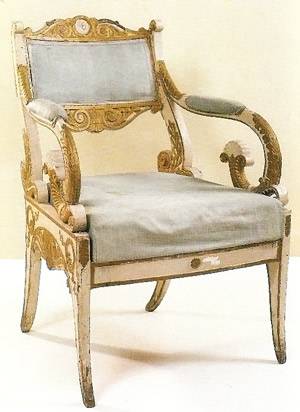Knowledge Center
Related Articles: Russian Furniture
1810-1825
Russian Furniture Styles - 1810-1825
Russian artisans never lost their ingenuity in varying the basic forms, nor, their ability to give life to their work. They enhanced their work by adding decorative elements and playing with contrasts of colour. They inserted tapestry or embroidered panels of flowers or animals, then used ebony as a means of heightening the warmth of natural wood. Rosettes and small gilt bronze stars were often placed in the border of the back and in the bolutes of the armrests. Architect Carlo Rossi designed several pieces for the Winter Palace, favoring natural woods, many of which were made by Bauman. Vasily Stasov designed chairs with lateral uprights in one piece that were an innovation at this time. Made from a single piece of wood from the base of the legs to the top of the back that yielded great balance and lightness.


Above top: A table-desk with an X-shaped stretcher surmounted by a basket of fruit, in natural, carved and ebonized wood, c. 1815 (Shchusev Museum, Moscow)
Above bottom: An armchair in carved, painted and gilded wood with lateral uprights in one piece, (Shcusev Museum, Moscow)
Source: Russian Furniture The Golden Age 1780-1840, Antoine Chenevière